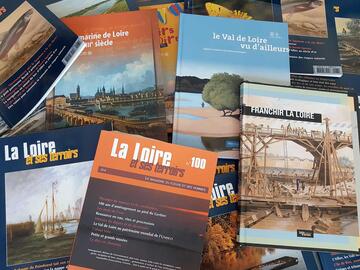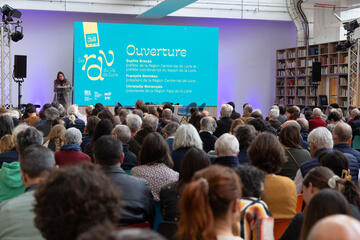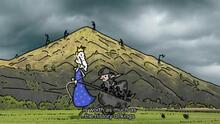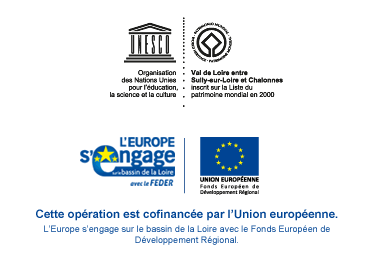In 2010, the City of Chalonnes-sur-Loire called on the services of a duo composed of visual artist Pierre Mabille and master glass artist Gilles Rousvoal to rework 12 of Saint-Maurille Church’s 14 stained-glass windows (the church is a listed Historical Monument). The project was voted “best national artistic submission” of 2012 by the Ministry of Culture and Communication’s National Advisory Committee on Public Commissions, for the quality of its creation and renovation. The contemporary stained-glass windows that now form an immediately apparent ensemble (blue in the south and yellow in the north) were inaugurated on 28 June 2014.
Saint-Maurille Church
Perched on a rocky peak overlooking the river, Saint-Maurille Church enjoys an outstanding setting. Maurille, fourth Bishop of Angers, came to the region to serve Saint Martin of Tours; he died in 453, to become the first great name in Anjou’s Christian heritage. The Loire Valley’s troubled history, marked by Norman invasions and the ravages of the Revolution, led 19th-century restorers to keep the church’s 12th-century chancel along with its cupola and Plantagenet chapel. The river’s caprices and the evolution of its beds necessitated the raising of the nave and sanctuary’s floor levels, which explains the stained-glass windows’ extraordinary height.
“I imagined that, upon entering Saint-Maurille de Chalonnes-sur-Loire Church, the vivacity and boldness of a direct chromatic impact might well form a fine contrast to the exterior’s minerality, providing the interior with its own light – a new luminosity that I divided in my mind into three distinct areas of colour: that of the nave, that of the chancel and that of the west portal. (…) My project seeks to provide “that something” which augments the church’s presence, which adds while taking nothing away. It seems to me that, by keeping to a formally restrained approach devoid of stylistic artifice, the materials, shapes and colours give off their full density in this architecture and light.”
Pierre Mabille, May 2014
The Ministry of Culture and Communication’s public commissions
By lending its support to public commissions for art works, the State, represented by the Ministry of Culture and Communication, bears witness to its determination to stand by its public partners (local authorities and public institutions, sometimes in association with private partners) in enriching the nation’s heritage and living environment.
Public commissions enable maximum numbers of people to familiarise themselves with contemporary creation.
On the web:
On this website:
Other contemporary creations in religious edifices:




![Nouvelles Renaissance(s] 2023](/var/storage/images/val-de-loire-refonte/dossier-de-parametrage/pied-de-page/nouvelles-renaissance-s-2023/517479-13-fre-FR/Nouvelles-Renaissance-s-2023_image_largeur220.png)


 Lettre d'information
Lettre d'information
 Facebook
Facebook
 Flickr
Flickr
 Podcloud
Podcloud
 Dailymotion
Dailymotion
 Box
Box
 Slideshare
Slideshare
 Diigo
Diigo

